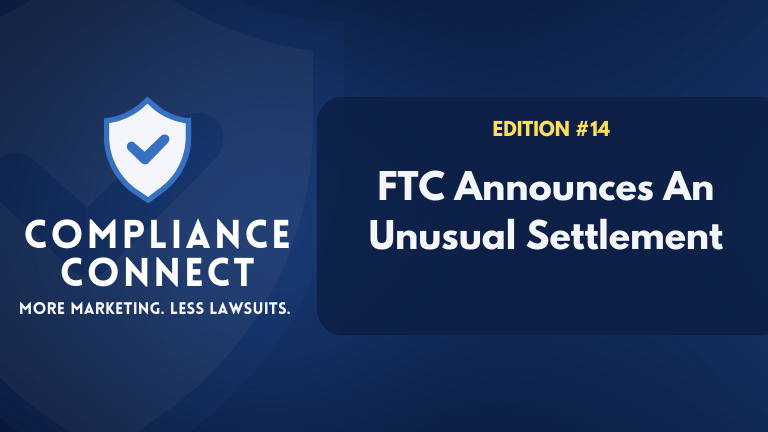Good morning! This is the fourteenth edition of the Compliance Connect newsletter.
The goal is simple: to keep you in the loop on what the FTC and other regulatory agencies are up to so that you can protect yourself.
These newsletters will land in your inbox twice a week – Mondays and Thursdays.
Remember: this is NOT legal advice, only information!
Here’s the rundown today…
- 🤝 FTC Reaches An Unusual Settlement
- 🔄 Click To Cancel Rule Watered Down?
- 🚨 Announcing The 100% FREE 3-Day “Get Compliant” Challenge!
- 🏪 The Franchise Rule Explained In Simple Terms
- 📊 How Do You Establish “Typicality”?
Compliance Digest: What You Should Read Today
FTC Settles With Qargo Coffee For $30,000 In Unusual Case
The FTC took action against Qargo Coffee for violating the Franchise Rule by failing to disclose critical information to prospective franchisees.
This is a RARE case involving the Franchise Rule, which has only been invoked twice over the past 17 years.
The company did not provide necessary details in its franchise disclosure document, including information about the founder’s history of filing for bankruptcy.
The FTC also found that Qargo misrepresented certain facts and labeled California franchisees as “licensees” without providing proper disclosures.
As part of the proposed settlement, Qargo and its founders will pay $30,000, allow franchisees to rescind contracts, and void noncompete agreements.
The order also requires Qargo to avoid deceptive practices and comply fully with the Franchise Rule moving forward.
Gym Owners Claim That Final “Click To Cancel” Could Have Been Stricter
On Thursday we talked about the FTC’s new Click To Cancel rule, which states that businesses must make it easy to cancel a recurring membership.
This will have a big impact on gyms in particular, who are notorious for making it difficult to cancel a membership.
This article quotes an association of gym owners who claim that gym owners got some key concessions.
The two biggest concessions were that the new rule…
- Does NOT require businesses to give an annual reminder of the membership
- Allows for “save attempts” so long as those attempts don’t impede a consumer’s ability to cancel a membership

What Is The Franchise Rule?
Every franchise that does business in the United States is regulated by the FTC and specific state laws.
The main rule the FTC enforces is the Franchise Rule. This is the rule the FTC used against Qargo Coffee.
The case is unusual because this is only the second time the FTC has filed against a company for violating the franchise rule over the past 17 years.
Why Franchises Are Regulated
Franchises allow people to run a business using a well-known brand’s name and systems.
They’re often marketed as a “business in a box,” with promises of extensive support to help new franchise owners succeed.
This appeals to individuals who dream of owning a business, but don’t want to build their own brand from the ground up.
The TRUTH behind those promises is crucial.
Franchisees typically sign long-term contracts and invest significant amounts of money—sometimes even taking on debt—so it’s essential that the franchisor’s CLAIMS hold up.
Because there’s an imbalance between the franchisee and the franchisor, the FTC and states believe that there needs to be regulation.
It’s All About Disclosures
The FTC’s Franchise Rule, along with most state laws, require the franchise company to provide detailed disclosures to all those thinking of starting that franchise.
There are 23 items that must be disclosed, including things like…
- How the model works
- Costs involved in buying and running the franchise
- Substantiated and typical historical rates of returns
- How long it takes to open the franchise
- Contact information of current and past franchisees
- Any litigation history
- Assistance offered by the franchisor
Failing to provide these disclosures can result in massive fines or even losing the ability to be a franchisor.
If you are considering the franchise business model, then you need to read up on the Franchise Rule and relevant state laws!
Did You Know…
Section 18 of the FTC Act gives the FTC the power to create rules that define and prohibit unfair or deceptive business practices
Quick Compliance Tip: Typical Results
Many businesses misuse customer testimonials. This leaves the door WIDE OPEN for the FTC and other regulators.
One of the most important things that you need to establish BEFORE using a customer testimonial is that it’s a “typical” result and not an outlier.
You need enough evidence that it’s a “typical” result to be able to prove it to a neutral third party.
This is tough to do, but it is possible. Here’s how to do it…
1. Survey your customers
Create a mechanism to regularly collect feedback from your customers to track their actual results.
You should aim for a reasonable response rate, typically around 10% or higher, which allows for a credible sample size.
2. Substantiate the claims
After collecting the data, verify the claims made by customers to ensure they are accurate and not exaggerated.
This might involve reaching out to customers individually for more information.
3. Disclose the process
Be TRANSPARENT with your audience. When presenting results, disclose how many people you surveyed, how many responded, and what the actual data shows.
For example, “We surveyed 1,000 customers, and 100 responded. Of those, 20% made no money, 30% broke even, and 50% made between $1,000 and $5,000.”
4. Think Ahead
Instead of trying to go back and collect data after the fact, which is EXPENSIVE, build data collection into your onboarding process.
For example, companies like Beachbody (formerly P90X) have participants check in throughout their program, providing valuable data points that can be tracked over time.
Consider Using Other Testimonials
As you can see, establishing typical results isn’t easy.
That’s why we prefer using experience-based or character-based testimonials, which don’t make any claims and don’t have to be substantiated.
This can help avoid these risks while still providing valuable social proof.
